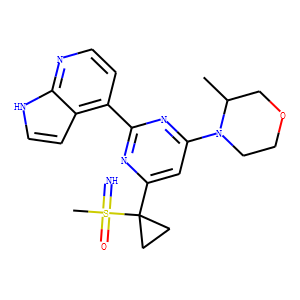| Reference | 1. Mol Cancer Ther. 2017 Apr;16(4):566-577. doi: 10.1158/1535-7163.MCT-16-0378. Epub 2017 Jan 30.<br />
AZD6738, A Novel Oral Inhibitor of ATR, Induces Synthetic Lethality with ATM Deficiency in Gastric Cancer Cells.<br />
Min A(1)(2), Im SA(3)(2)(4), Jang H(1), Kim S(1), Lee M(1), Kim DK(5), Yang Y(1)(4), Kim HJ(1)(6), Lee KH(1)(2)(4), Kim JW(1)(7), Kim TY(1)(2)(4), Oh DY(1)(2)(4), Brown J(8), Lau A(9), O/'Connor MJ(9), Bang YJ(1)(2)(4).<br />
Author information:<br />
(1)Cancer Research Institute, Seoul National University, Seoul, Korea. (2)Biomedical Research Institute, Seoul National University Hospital, Seoul, Korea. (3)Cancer Research Institute, Seoul National University, Seoul, Korea. [email protected]. (4)Department of Internal Medicine, Seoul National University College of Medicine, Seoul, Korea. (5)Rice University, Houston, Texas. (6)Department of Internal Medicine, Chung Ang University College of Medicine, Seoul, Korea. (7)Department of Internal Medicine, Seoul National University Bundang Hospital, Seongnam, Korea. (8)AstraZeneca R&D Boston, Waltham, Massachusetts. (9)AstraZeneca UK Ltd., Macclesfield, Cheshire, United Kingdom.<br />
Ataxia telangiectasia and Rad3-related (ATR) can be considered an attractive target for cancer treatment due to its deleterious effect on cancer cells harboring a homologous recombination defect. The aim of this study was to investigate the potential use of the ATR inhibitor, AZD6738, to treat gastric cancer.In SNU-601 cells with dysfunctional ATM, AZD6738 treatment led to an accumulation of DNA damage due to dysfunctional RAD51 foci formation, S phase arrest, and caspase 3-dependent apoptosis. In contrast, SNU-484 cells with functional ATM were not sensitive to AZD6738. Inhibition of ATM in SNU-484 cells enhanced AZD6738 sensitivity to a level comparable with that observed in SNU-601 cells, showing that activation of the ATM-Chk2 signaling pathway attenuates AZD6738 sensitivity. In addition, decreased HDAC1 expression was found to be associated with ATM inactivation in SNU-601 cells, demonstrating the interaction between HDAC1 and ATM can affect sensitivity to AZD6738. Furthermore, in an in vivo tumor xenograft mouse model, AZD6738 significantly suppressed tumor growth and increased apoptosis.These findings suggest synthetic lethality between ATR inhibition and ATM deficiency in gastric cancer cells. Further clinical studies on the interaction between AZD 6738 and ATM deficiency are warranted to develop novel treatment strategies for gastric cancer. Mol Cancer Ther; 16(4); 566-77. ©2017 AACR.<br />
2. Int J Cancer. 2017 Jan 1;140(1):109-119. doi: 10.1002/ijc.30373. Epub 2016 Oct 21.<br />
Anti-tumor activity of the ATR inhibitor AZD6738 in HER2 positive breast cancer cells.<br />
Kim HJ(1)(2), Min A(3)(4), Im SA(2)(3)(4)(5), Jang H(3), Lee KH(3)(4)(5), Lau A(6), Lee M(3), Kim S(3), Yang Y(2)(3)(5), Kim J(3), Kim TY(2)(3)(4)(5), Oh DY(2)(3)(4)(5), Brown J(7), O/'Connor MJ(6), Bang YJ(2)(3)(4)(5).<br />
Author information:<br />
(1)Department of Internal Medicine, Chung-Ang University College of Medicine, Seoul, Korea. (2)Translational Medicine, Seoul National University College of Medicine, Seoul, Korea. (3)Cancer Research Institute, Seoul National University, Seoul, Korea. (4)Biomedical Research Institute, Seoul National University Hospital, Seoul, Korea. (5)Department of Internal Medicine, Seoul National University College of Medicine, Seoul, Korea. (6)AstraZeneca UK Ltd, Macclesfield, Cheshire, United Kingdom. (7)AstraZeneca Ltd, Waltham, MA, USA.<br />
Ataxia telangiectasia and Rad3-related (ATR) proteins are sensors of DNA damage, which induces homologous recombination (HR)-dependent repair. ATR is a master regulator of DNA damage repair (DDR), signaling to control DNA replication, DNA repair and apoptosis. Therefore, the ATR pathway might be an attractive target for developing new drugs. This study was designed to investigate the antitumor effects of the ATR inhibitor, AZD6738 and its underlying mechanism in human breast cancer cells. Growth inhibitory effects of AZD6738 against human breast cancer cell lines were studied using a 3-(4,5-dimethylthiazol-2-yl)-2,5-diphenyltetrazolium bromide (methyl thiazolyl tetrazolium, MTT) assay. Cell cycle analysis, Western blotting, immunofluorescence and comet assays were also performed to elucidate underlying mechanisms of AZD6738 action. Anti-proliferative and DDR inhibitory effects of AZD6738 were demonstrated in human breast cancer cell lines. Among 13 cell lines, the IC50 values of nine cell lines were less than 1 μmol/L using MTT assay. Two cell lines, SK-BR-3 and BT-474, were chosen for further evaluation focused on human epidermal growth factor receptor 2 (HER2)-positive breast cancer cells. Sensitive SK-BR-3 but not the less sensitive BT-474 breast cancer cells showed increased level of apoptosis and S phase arrest and reduced expression levels of phosphorylated check-point kinase 1 (CHK1) and other repair markers. Decreased functional CHK1 expression induced DNA damage accumulation due to HR inactivation. AZD6738 showed synergistic activity with cisplatin. Understanding the antitumor activity and mechanisms of AZD6738 in HER2-positive breast cancer cells creates the possibility for future clinical trials targeting DDR in HER2-positive breast cancer treatment.<br />
3. Sci Rep. 2015 Aug 27;5:13545. doi: 10.1038/srep13545.<br />
Bridging the gap between in vitro and in vivo: Dose and schedule predictions for the ATR inhibitor AZD6738.<br />
Checkley S(1), MacCallum L(1), Yates J(1), Jasper P(2), Luo H(2), Tolsma J(2), Bendtsen C(1).<br />
Author information:<br />
(1)AstraZeneca, Alderley Park, Macclesfield, SK10 4TG. UK. (2)RES Group Inc. Boston, MA. USA.<br />
Understanding the therapeutic effect of drug dose and scheduling is critical to inform the design and implementation of clinical trials. The increasing complexity of both mono, and particularly combination therapies presents a substantial challenge in the clinical stages of drug development for oncology. Using a systems pharmacology approach, we have extended an existing PK-PD model of tumor growth with a mechanistic model of the cell cycle, enabling simulation of mono and combination treatment with the ATR inhibitor AZD6738 and ionizing radiation. Using AZD6738, we have developed multi-parametric cell based assays measuring DNA damage and cell cycle transition, providing quantitative data suitable for model calibration. Our in vitro calibrated cell cycle model is predictive of tumor growth observed in in vivo mouse xenograft studies. The model is being used for phase I clinical trial designs for AZD6738, with the aim of improving patient care through quantitative dose and scheduling prediction.<br />
|

